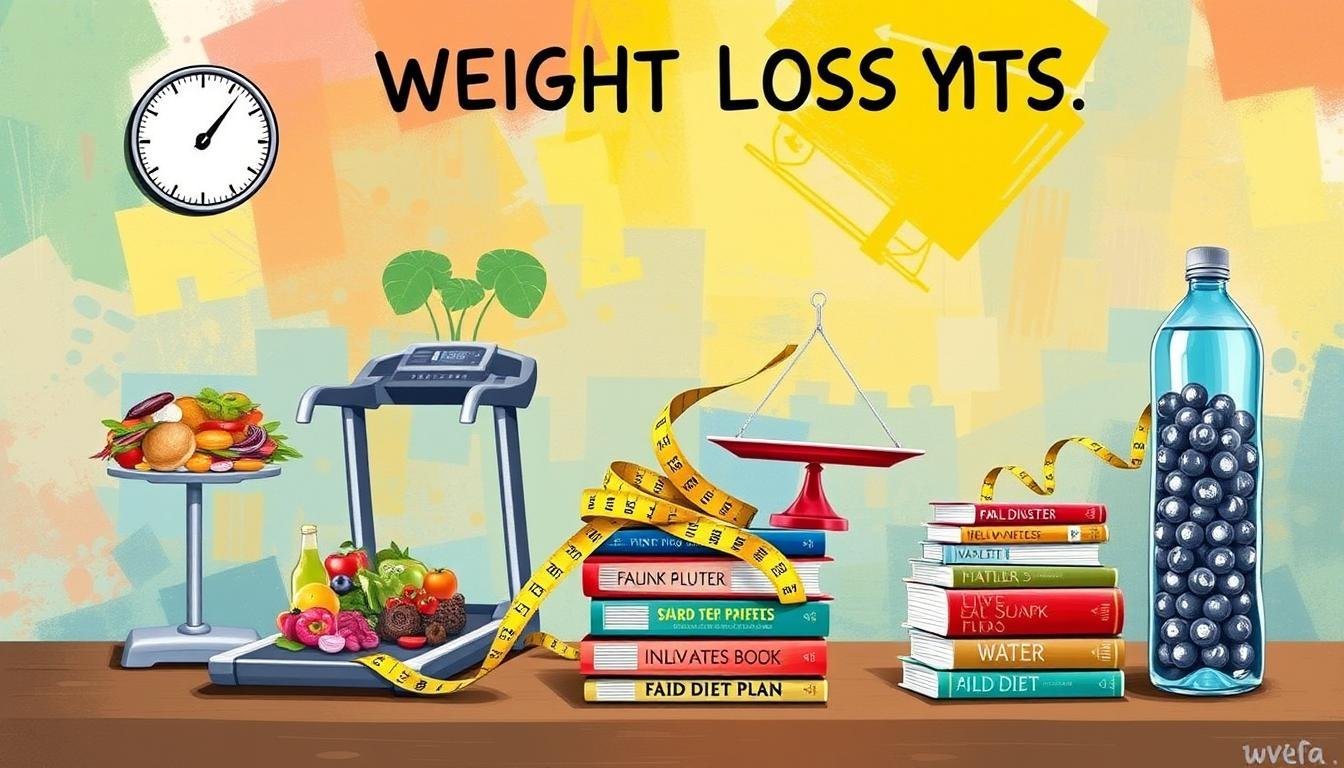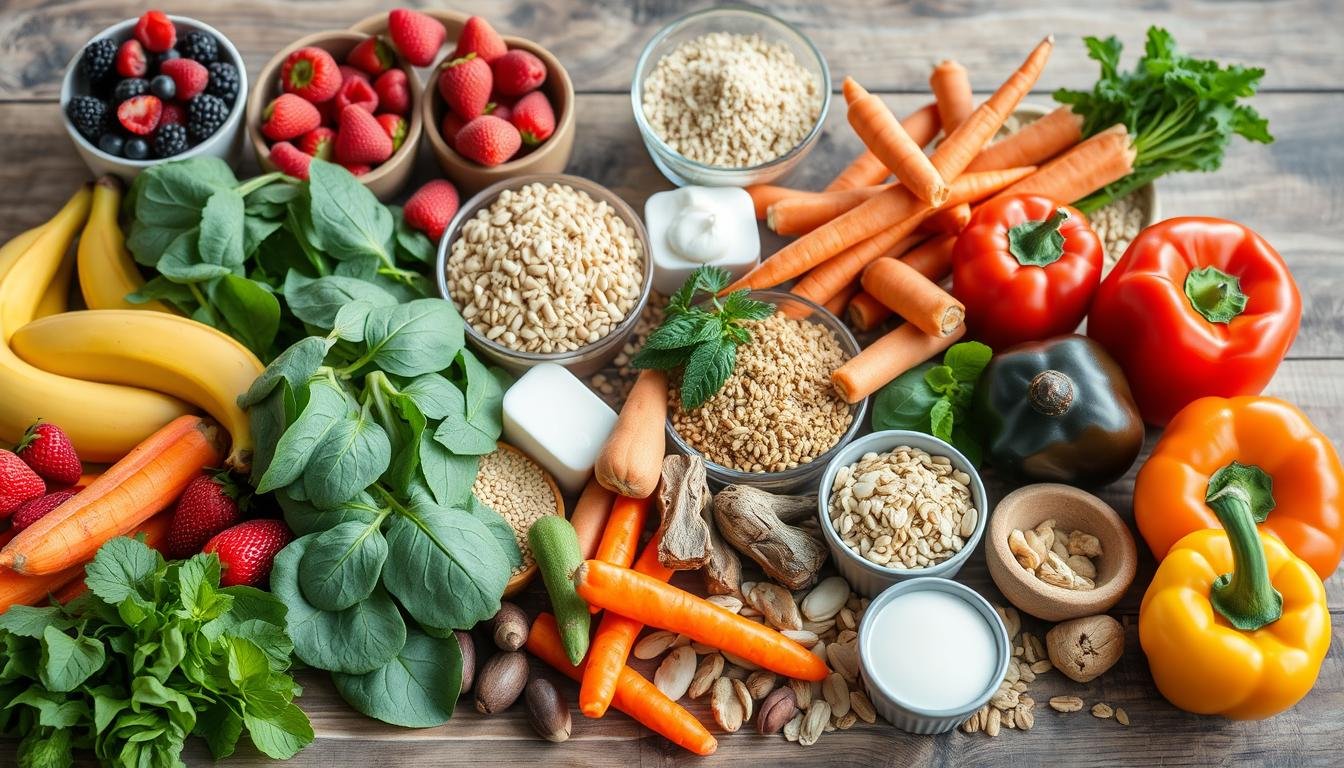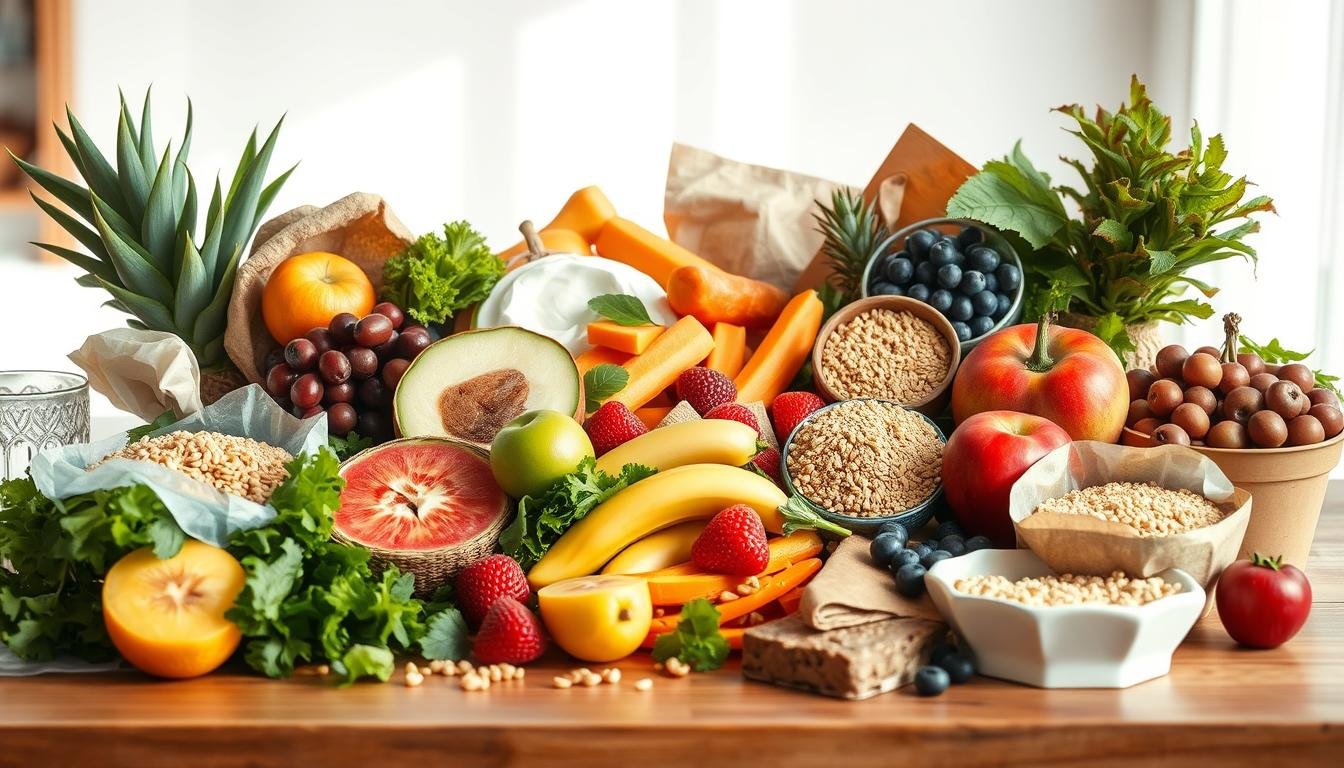The fight against weight gain is a battle against our biology. Obesity is a natural response to the abundance of unhealthy foods. Almost 40% of Americans are overweight, and about 8% are severely obese.
Our genes and easy access to bad food play a big role. Registered dietitian Amelia Bandera says we should be careful with weight loss. She advises getting advice from healthcare professionals before making big changes. Many diets and myths don’t have long-term science backing.
Weight loss isn’t just about eating less and moving more. Sleep, stress, and hormones also affect our weight. The idea that carbs are bad and lemon water can melt fat is wrong.
In this article, we’ll look at the top 5 myths about weight loss. We’ll find out the facts that can help you reach your health and fitness goals.
Weight Loss is Not as Simple as “Eat Less, Move More”
Creating a calorie deficit is key for losing weight. But, our bodies are complex, and sleep and stress play big roles. Lack of sleep can make us hungrier and choose worse foods, raising the risk of obesity by 41% for those sleeping less than 7 hours.
Stress also boosts the hunger hormone cortisol. This makes us more likely to eat unhealthy foods for comfort.
Sleep and Stress Impact Weight Loss
Hormonal changes, like those in menopause, can lead to weight gain. These changes affect our muscle and fat storage. It’s clear that losing weight isn’t just about eating less and moving more.
Factors like sleep, stress, and hormonal shifts are key to losing and keeping off weight.
The U.S. weight loss industry is a $20 billion market each year. Many Americans try quick fixes. But, these often fail, leaving people feeling desperate.
A better, lasting approach is needed for successful weight loss.
Carbohydrates Are Not the Enemy
Some people think carbs are bad for weight loss. But, the truth is more complex. Registered dietitian Amelia Bandera says carbs give us energy, fiber, and important nutrients.
Low-carb diets are popular, but research shows they’re not always better. A balanced diet with some carbs can help manage weight well. It’s important to choose whole grains, starchy veggies, and fiber-rich foods over processed carbs.
Experts say carbs should make up 40 to 45% of our calories. Healthy fats should be 30 to 35%, and proteins about 30%. This mix helps our bodies work well and keeps us at a healthy weight.
Not all carbs are the same. Simple carbs in fruits, veggies, and dairy are better than refined grains and processed snacks. These can raise blood sugar and lead to weight gain. Choosing nutrient-dense carbs helps us enjoy carbs while losing weight.
For lasting weight loss, a balanced diet is key. It should include carbs, proteins, and healthy fats. With the right guidance, we can lose weight in a healthy and satisfying way.
| Carb Intake Guidelines | Amount |
|---|---|
| Recommended daily carb intake | 130-150 grams |
| Carb content in a typical meal | 45-75 grams |
| Carb content in a large blended coffee | 94 grams |
| Ideal carb percentage in a balanced diet | 40-45% |
| Carb percentage in a low-carb diet | 45% |
| Carb percentage in a very low-carb diet | less than 40% |
Drinking Lemon Water Alone Won’t Melt Fat
The idea that lemon water can melt away body fat is a weight loss myth from the 1940s. It was popularized by the “master cleanse” diet. While lemon water can help with hydration, it doesn’t burn fat directly.
Registered dietitian Amelia Bandera says that cutting out food groups or skipping meals can lead to quick weight loss. But, the weight usually comes back once you stop the diet. Lemon water might help control blood sugar, but it’s best used in a balanced diet, not as a quick weight loss method.
Lemon water doesn’t have special fat-loss benefits. It has some nutrients and phytochemicals, but it doesn’t add many calories. Drinking 16 ounces of water before meals can aid in weight loss. Some studies suggest drinking more water can also boost metabolism and fat burning.
| Nutrient | Chickpeas (100g) | Whey Protein (100g) |
|---|---|---|
| Protein | 9g | 90g |
| Carbohydrates | 27g | 3g |
Chickpeas are often thought to be high in protein, but they have 9g of protein and 27g of carbs per 100g. They are actually higher in carbs than protein. Whey protein, on the other hand, is a safe and effective protein source that boosts muscle protein synthesis.
Lemon water is refreshing and hydrating, but it shouldn’t be seen as a fad diet or a quick weight loss method. Sustainable weight loss comes from a balanced diet, good hydration, and lifestyle changes, not just one ingredient or quick fix.
Top 5 Myths About Weight Loss
Weight loss is a complex journey. It’s important to know the truth from myths. Registered dietitian Amelia Bandera has debunked many misconceptions from the weight loss industry.
One myth is that “eat less, move more” is the only way to lose weight. But, sleep, stress, and hormones also play big roles. Another myth is that carbs are bad for you. It’s actually about choosing the right carbs for a healthy diet.
Drinking lemon water to lose fat is another myth. While staying hydrated is key, water alone doesn’t lead to weight loss. Also, cutting calories too much isn’t the best way to lose weight. It’s about keeping healthy habits for the long term.
The idea that hormonal changes in life stages like menopause make losing weight impossible is also a myth. Bandera says we should look at weight loss as a whole. We shouldn’t rely on quick fixes or diets without science backing them.
| Myth | Fact |
|---|---|
| Gluten-free diet is for weight loss | Gluten-free diet is only intended for those with gluten sensitivity or celiac disease, not for weight loss |
| Strength training leads to bulking up | Strength training increases muscle mass, which can aid in weight control |
| Avoiding all carbs is necessary for weight loss | Distinguishing between good and bad carbohydrates is essential for a balanced diet |
| Drinking water alone causes weight loss | Water can help reduce snacking, but it does not directly cause weight loss |
| Obesity is solely due to lack of willpower | Obesity is a multifaceted issue with various contributing factors, including genetic variables and medical conditions |
By understanding and debunking these myths, we can start our health journey better. This leads to lasting results.
Excessive Calorie Restriction Is Not the Answer
Extreme calorie restriction is not good for sustainable weight loss. A calorie deficit is needed to lose weight, but too little can harm your health. It’s not a lasting solution.
Registered dietitian Amelia Bandera says finding a balanced way to manage weight is crucial. This means eating healthy, staying active, and managing stress. Avoiding extreme calorie cuts and unproven weight loss methods is important.
Finding a Sustainable Approach
Bandera stresses the need to review your diet and focus on protein. Protein helps build strength and keep muscle while losing weight. Also, regular exercise, like strength training, is better than too much cardio or cutting calories too much.
The CDC suggests losing no more than 2 pounds a week for lasting weight loss. A study in the Annals of Internal Medicine showed that eating regularly and a 10-hour eating window both work for weight loss. This proves the value of a balanced, sustainable approach.
By choosing a healthy, balanced way to manage weight, you can avoid the risks of extreme calorie restriction. Sustainable weight loss is about making lasting lifestyle changes, not quick fixes.
Hormonal Changes and Weight Gain
Hormonal changes, like those in menopause, can affect weight management a lot. Registered dietitian Amelia Bandera says about 90% of women in menopause gain weight, often around the belly. This is because of drops in hormones like progesterone, estrogen, and testosterone.
These hormonal shifts make it tough for the body to keep muscle and control fat. Bandera suggests looking at your diet, eating more protein, and doing strength exercises. This helps keep muscle and supports a healthy weight.
Research shows that adding estradiol and testosterone can fight off weight gain at menopause. By tackling the hormonal changes, women can find ways to manage their weight during this time.
Hormones are key in managing weight, more so for women in menopause. Knowing how hormonal changes affect us and using the right strategies can help us stay healthy during this tough time.
Conclusion
When it comes to weight loss, we need to look at it from all angles. Registered dietitian Amelia Bandera points out that many myths, like “eat less, move more,” are not true. These myths can even harm our efforts to stay healthy.
Instead, we should focus on a balanced approach. This includes sleep, stress, hormones, and more. It’s key to finding lasting ways to lose and keep weight off.
Getting help from health experts, like registered dietitians, is crucial. They can create a plan that fits your life and needs. This way, you can avoid common pitfalls and achieve your goals.
By understanding and avoiding these myths, we can succeed in weight loss. The help of experts like Amelia Bandera is invaluable. They offer the support and advice we need for a healthy weight.
Weight loss is not a one-size-fits-all solution. It requires a deep understanding of the many factors involved. By taking a balanced and personalized approach, we can overcome the myths that have misled us for so long.





